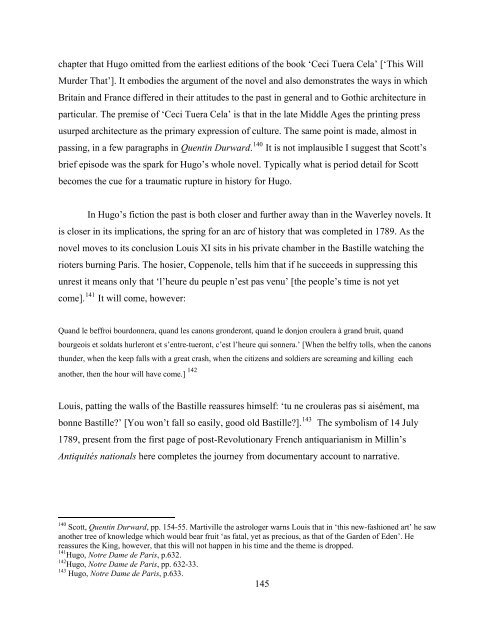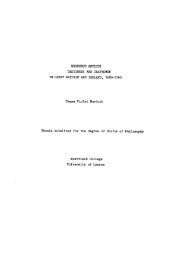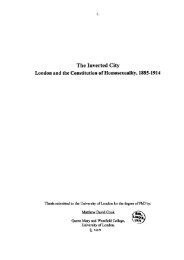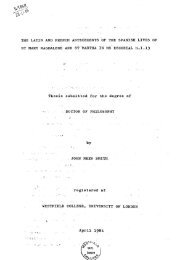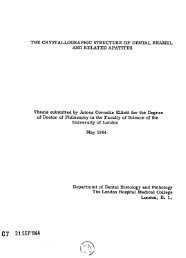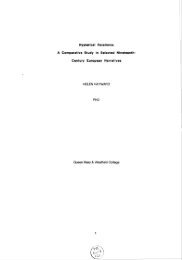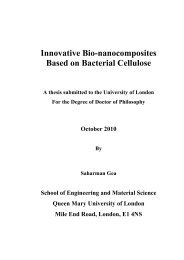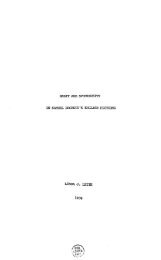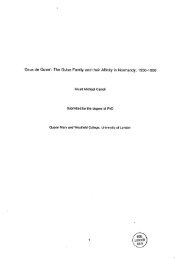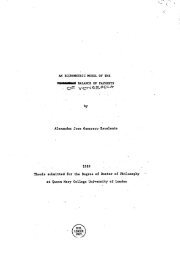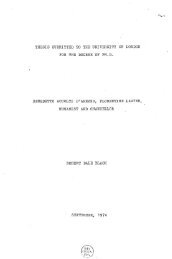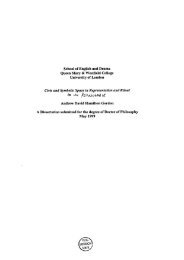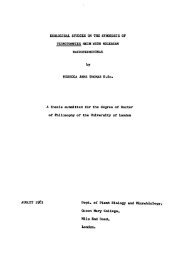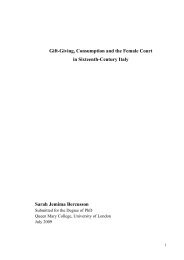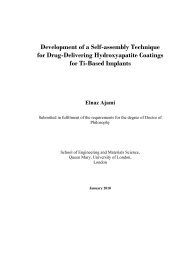Antiquaries in the Age of Romanticism: 1789-1851 - Queen Mary ...
Antiquaries in the Age of Romanticism: 1789-1851 - Queen Mary ...
Antiquaries in the Age of Romanticism: 1789-1851 - Queen Mary ...
Create successful ePaper yourself
Turn your PDF publications into a flip-book with our unique Google optimized e-Paper software.
chapter that Hugo omitted from <strong>the</strong> earliest editions <strong>of</strong> <strong>the</strong> book ‘Ceci Tuera Cela’ [‘This Will<br />
Murder That’]. It embodies <strong>the</strong> argument <strong>of</strong> <strong>the</strong> novel and also demonstrates <strong>the</strong> ways <strong>in</strong> which<br />
Brita<strong>in</strong> and France differed <strong>in</strong> <strong>the</strong>ir attitudes to <strong>the</strong> past <strong>in</strong> general and to Gothic architecture <strong>in</strong><br />
particular. The premise <strong>of</strong> ‘Ceci Tuera Cela’ is that <strong>in</strong> <strong>the</strong> late Middle <strong>Age</strong>s <strong>the</strong> pr<strong>in</strong>t<strong>in</strong>g press<br />
usurped architecture as <strong>the</strong> primary expression <strong>of</strong> culture. The same po<strong>in</strong>t is made, almost <strong>in</strong><br />
pass<strong>in</strong>g, <strong>in</strong> a few paragraphs <strong>in</strong> Quent<strong>in</strong> Durward. 140 It is not implausible I suggest that Scott’s<br />
brief episode was <strong>the</strong> spark for Hugo’s whole novel. Typically what is period detail for Scott<br />
becomes <strong>the</strong> cue for a traumatic rupture <strong>in</strong> history for Hugo.<br />
In Hugo’s fiction <strong>the</strong> past is both closer and fur<strong>the</strong>r away than <strong>in</strong> <strong>the</strong> Waverley novels. It<br />
is closer <strong>in</strong> its implications, <strong>the</strong> spr<strong>in</strong>g for an arc <strong>of</strong> history that was completed <strong>in</strong> <strong>1789</strong>. As <strong>the</strong><br />
novel moves to its conclusion Louis XI sits <strong>in</strong> his private chamber <strong>in</strong> <strong>the</strong> Bastille watch<strong>in</strong>g <strong>the</strong><br />
rioters burn<strong>in</strong>g Paris. The hosier, Coppenole, tells him that if he succeeds <strong>in</strong> suppress<strong>in</strong>g this<br />
unrest it means only that ‘l’heure du peuple n’est pas venu’ [<strong>the</strong> people’s time is not yet<br />
come]. 141 It will come, however:<br />
Quand le beffroi bourdonnera, quand les canons gronderont, quand le donjon croulera à grand bruit, quand<br />
bourgeois et soldats hurleront et s’entre-tueront, c’est l’heure qui sonnera.’ [When <strong>the</strong> belfry tolls, when <strong>the</strong> canons<br />
thunder, when <strong>the</strong> keep falls with a great crash, when <strong>the</strong> citizens and soldiers are scream<strong>in</strong>g and kill<strong>in</strong>g each<br />
ano<strong>the</strong>r, <strong>the</strong>n <strong>the</strong> hour will have come.] 142<br />
Louis, patt<strong>in</strong>g <strong>the</strong> walls <strong>of</strong> <strong>the</strong> Bastille reassures himself: ‘tu ne crouleras pas si aisément, ma<br />
bonne Bastille?’ [You won’t fall so easily, good old Bastille?]. 143 The symbolism <strong>of</strong> 14 July<br />
<strong>1789</strong>, present from <strong>the</strong> first page <strong>of</strong> post-Revolutionary French antiquarianism <strong>in</strong> Mill<strong>in</strong>’s<br />
Antiquités nationals here completes <strong>the</strong> journey from documentary account to narrative.<br />
140<br />
Scott, Quent<strong>in</strong> Durward, pp. 154-55. Martiville <strong>the</strong> astrologer warns Louis that <strong>in</strong> ‘this new-fashioned art’ he saw<br />
ano<strong>the</strong>r tree <strong>of</strong> knowledge which would bear fruit ‘as fatal, yet as precious, as that <strong>of</strong> <strong>the</strong> Garden <strong>of</strong> Eden’. He<br />
reassures <strong>the</strong> K<strong>in</strong>g, however, that this will not happen <strong>in</strong> his time and <strong>the</strong> <strong>the</strong>me is dropped.<br />
141<br />
Hugo, Notre Dame de Paris, p.632.<br />
142<br />
Hugo, Notre Dame de Paris, pp. 632-33.<br />
143<br />
Hugo, Notre Dame de Paris, p.633.<br />
145


